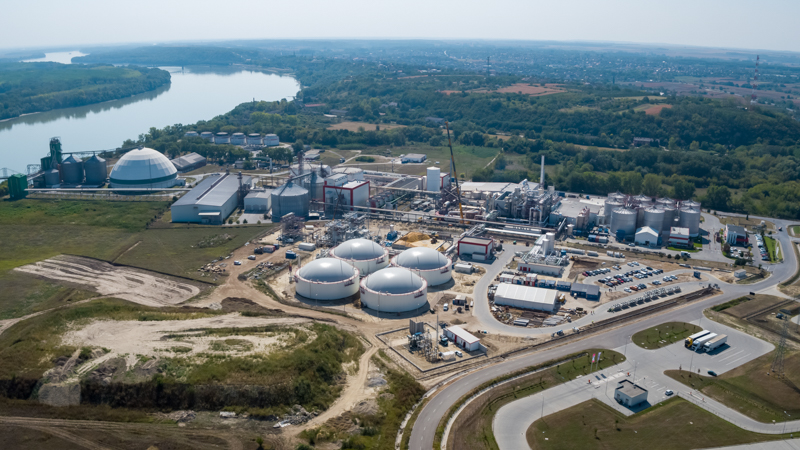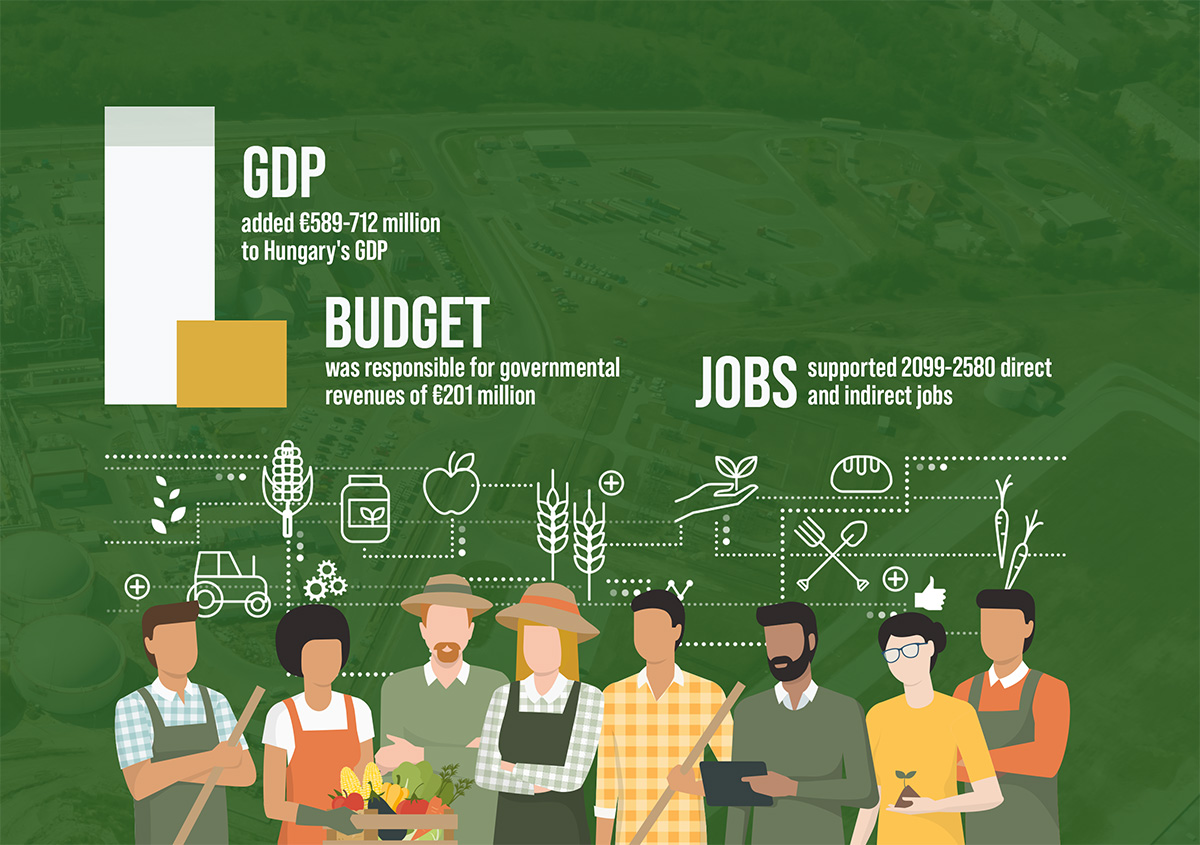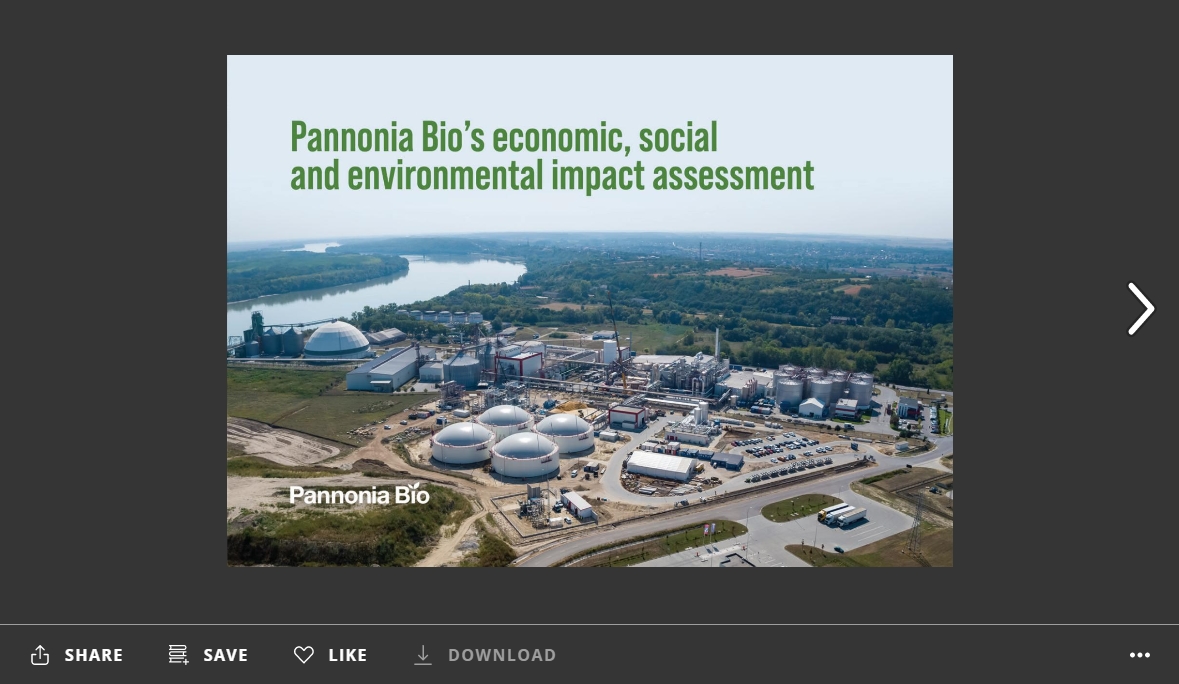Profile and history
Pannonia Bio operates a biorefinery in Dunaföldvár, Tolna County, Hungary. The plant, the largest corn processing facility in Central and Eastern Europe, uses state of the art production processes and is a nursery for development of new bio-based technologies. From its beginnings as a bioethanol producer in 2012, the biorefinery has almost tripled in size and developed into a multiproduct facility. Today, nutrition, health, biochemical and fuel bioproducts are manufactured as alternatives to fossil materials.

The biorefinery is also the largest ethanol plant in Europe, one of the most efficient biorefineries in the world and has a mission to mitigate climate change. A production in-house R&D team of 40 engineers and scientists has enabled diversification into new products and technologies.
Local processing of the corn for export adds considerable monetary and nutritional value to the raw material. The biorefinery annually processes over 1.2 million tons of feed corn to produce more than 300,000 tons of GMO-free protein-rich animal feed, over 500 million litres of bioethanol and over 10,000 tons of corn oil. Production of animal feed increases European food security while Pannonia Bio's ethanol protects the environment by a carbon intensity that is only 25% that of the petrol it displaces. It also supports the introduction of innovative new bioproducts that promise significant benefits for human and animal health.
The biorefinery is set in a rural area on the banks of the Danube, a hundred kilometers from Budapest in the very heart of Hungary’s maize-producing region. The nearest town, Dunaföldvár (population 10 thousand), is 5 km from the plant. Family farming is the predominant economic activity in the surrounding area.
The town of Dunaföldvár was affected negatively by the 2008 international recession. Natural decline in the population of the town was exacerbated by significant out-migration. In recent year’s improvements in employment and income turned the balance of migration positive and has made Dunaföldvár one of Hungary's more developed towns. The biorefinery has been a factor influencing this change.
Pannonia Bio is a family business founded by the Turley family. The founder Mark Turley, a successful entrepreneur from Ireland with a proven track record who diversified into the agribusiness sector, entered the renewables market in 2008. Construction begun in 2010 and the biorefinery commenced operations in 2012.

In recent years tens of millions of Euros have been invested into turning the plant into a true biorefinery that produces an ever-wider array of bio-based products. At Pannonia Bio, the entire composition of feed corn is utilized.
Few industries are capable of providing an attractive future in rural environments whilst contributing to climate change mitigation and energy independence as well as advancing farming and the bioeconomy.
Economic Assessment
For a family-owned business that is only a decade old, Pannonia's economic impact is remarkable. Pannonia Bio regularly assesses both its historical and prospective economic impacts in cooperation with HÉTFA Research Institute.

HÉTFA has produced four detailed studies of Pannonia Bio's impacts:
- a 2012 prospective estimate of impacts as the company was just beginning to operate;
- a 2016 calculation of Pannonia's past six year historical impact (2010-2015), together with a five year forward looking estimate (2016-2020); and
- a 2020 ex-post calculation of Pannonia Bio's economic impacts for the five years from 2015-2019.
- An ex-ante estimate also in 2020 of the upcoming impacts between 2020 and 2024.
The 2020 ex-post study assessing the impacts between 2015 and 2020 follows Pannonia Bio's rapid growth over the period to calculate that in 2019 Pannonia Bio:
- added €589-712 million to Hungary's GDP - €1.04 per every litre of ethanol produced;
- supported 2099-2580 direct and indirect jobs; and
- was responsible for governmental revenues of €201 million.
The vast majority (usually around 90%) of Pannonia Bio's economic impacts are indirect and result from construction, manufacturing and income effects, each of which is detailed in HÉTFA's studies.
In its ex-post analysis for the 5 year period between 2015–2019, HÉTFA finds evidence that Pannonia Bio is stimulating Hungarian farmers to invest more into their production and raising their yields. Pannonia Bio believes that this is indeed happening.
Prospective economic impacts
The second of two studies prepared in 2020 by HÉTFA Research Institute continues the efficiency scenario of the ex-post analysis in which a yield increase of Hungarian maize production was assumed due to Pannonia Bio’s ability to stabilize the demand for maize.

The ex-ante analysis on the macroeconomic impact of Pannonia Bio in Hungary forecasts for the 2020 – 2024 period:
- a cumulative GDP impact of € 4.9 billion
- a direct and indirect employment effect of ~ 5 000 persons, on average, each year
The impact of Pannonia Bio on GDP will be about 1 euro for each litre of bioethanol produced.
Advancing farming
In addition to direct market impacts on farming through the purchase of grains, there are spill-over effects. Investment in farming is stimulated by the presence of Pannonia Bio’s biorefinery, providing stable and predictable demand for agricultural produce. The presence of the plant lessens the risk inherent in farming investment. Investments into agricultural technology have been shown to be stimulated and, notably, every second investments would have had a lower likelihood of implementation, if at all, without the presence and operation of the biorefinery. Investments, in turn, lead to more sustainable farming practices. Latest science, based on research carried out on the impact of Pannonia Bio on farming, also shows that a credible biofuel policy contributes to the production of more biomass on the same amount of land and the extra biomass can be used for food, feed, biomaterials or bioenergy.
Rural renaissance
The biorefinery embodies sustainable rural development and is a showcase example of how to revitalise rural regions.
The plant employs more than 250 people directly and counting and has created thousands of jobs indirectly. It has significantly influenced the quality of life in its immediate neighbourhood, creating permanent jobs, reducing unemployment and outmigration, enhancing local public services and improving income levels.
Reversal of migration trend
Direct impacts of the plant have significantly influenced the quality of life in Dunaföldvár's immediate neighbourhood. These beneficial impacts include the creation of high quality permanent jobs; enhancing local public services for the community; lifting average incomes and better employee compensation packages than is usual for the area. Employees are mainly young and middle-aged people who live in the vicinity, a feature that may also be slowing out-migration of local career starters. The company offers job opportunities mainly to the highly qualified, reflecting its international operations and technology that requires specialist knowledge. In the absence of Pannonia Bio, this young, predominantly highly skilled labour force would have sought employment either elsewhere in Hungary or abroad as has happened elsewhere in the region.

In effect these local economic and social impacts resulted in a remarkable change in migration trends. In the 2000s Dunaföldvár was characterised by drastic outmigration, the town was losing inhabitants at a higher rate than recorded in the region. In the past few years, the trend has completely changed and Dunaföldvár experienced stimulated inward migration. The construction, operation and expansion of the plant has shown to reduce outmigration from the Dunaföldvár area of Hungary, and in fact contributed to an inflow of people, uniquely in the region. In essence Dunaföldvár, a place residents were fleeing a decade ago, has become a town attractive for people to reside.
Impacts on income
The plant offers attractive conditions and remuneration higher than typical for the locality. The impact on income locally is shown by a rise in those paying taxes in the highest income bracket. The average annual income of Dunaföldvár inhabitants has steadily increased since the construction and operation of the plant and today it is about as high as the national average. Income levels also generate additional demand for goods and services provided locally.

Impacts on Local Tax Revenue, Local Government and Business
The biorefinery has significantly improved the financial position of Dunaföldvár, securing a sizeable financial surplus for the town, enabling debt reduction and provided surplus funds for infrastructural upgrade. Pannonia Bio has in recent years become the town’s largest taxpayer.

Impacts on Lifestyle and Culture
Pannonia Bio has impacted community life, education and culture in the locality. Direct impact on Dunaföldvár takes two forms. One is the local business tax referred to earlier. The other channel is patronage of local government and public institutions. Initiatives include support for activities of the local sport club, regular sponsorship for the main annual events organised by the Cultural Centre of Dunaföldvár, and Christmas donation for needy families to be distributed by the local office of Red Cross in cooperation with the townhall. The local government in 2020 honoured Pannonia Bio with the title ‘For Dunaföldvár’s Sport Life”. Representatives of the public sector and civil society complemented the company on its CSR activities, noting that corporate support for the local community was unknown prior to its arrival.

Realisation of a European dream
The case of the corn processing plant in Dunaföldvár illustrates how a European dream of reviving disadvantaged rural communities could be effectively pursued. It is a lot easier to create jobs in urban environments, doing it further away from business centers is much more challenging. Few industries are capable to provide an attractive future in rural environments, and at the same time contribute to climate change mitigation and energy independence. Farming in Europe faces difficult times ahead. The prospects are bleak for farming in the Central and Eastern part of Europe. Biorefineries could play a crucial role in advancing farming in CEE countries, thereby contributing to the convergence of regions, a core constitutional objective of the European project. Biorefineries embody rural renaissance.

Climate change mitigation
Renewable ethanol provides an effective solution to reduce GHG emissions from the road transport sector – the only sector that has been unable to reduce its climate impact. Due to never-ending investments in efficiency and innovations, the climate profile of the ethanol produced has kept improving. 2019 figures show that it reduces GHG emissions by 73% compared to petrol. The installation of further energy efficiency technologies to be completed in 2020 is expected to bring average GHG saving to about 80%. Furthermore, based on the trend apparent since operation begun, the plant is on-track to become carbon neutral by 2030.

It must be noted that the relevant regulation (Renewable Energy Directive II) requires only 50% GHG savings achieved by biofuels, so Pannonia Bio’s ethanol vastly overperforms, allowing for harvesting a price premium on markets sensitive to the carbon intensity of fuels (for instance Germany).

Cost of transport decarbonisation matters
Cost of transport decarbonisation matters and ethanol is one of the most cost-efficient transport decarbonisation measures available at scale. Recent research shows that the carbon abatement cost of ethanol is one of the lowest in available technological options in Central and Eastern Europe to decarbonise road transport.

Environmental footprint
Energy efficiency is a key indicator of environmental impacts. Pannonia Bio has been at the forefront of industrial innovation, including investments in energy efficiency. Likewise, the plant’s energy consumption per unit of output have substantially decreased over the past few years. As a result of implementing latest technologies, natural gas consumption, the primary process energy, will have been reduced by nearly 30% by the end of 2020.

Avoiding waste generation is a cornerstone of industrial ecology. By lowering waste, the burden on the environment is reduced. At Pannonia Bio no industrial waste is generated. All the components of the feedstock are utilised and turned into a product. In line with the principles of the bioeconomy, each components of corn are utilised. Emissions to air largely comprise of steam. Overall, the plant has minimal to no waste discharged to the environment.
Overall benefits
The operation of the biorefinery brings a variety of benefits including:
-
Economic impact: Through regional and national impacts it adds hundreds of million Euros to Hungary's GDP and is responsible for governmental revenues of more than €100 million.
-
Boosting the local economy: It creates permanent and predictable demand for a wide range of suppliers, which boosts competitiveness of the local economy, diversifies activities and stimulates employment.
-
Jobs created: Jobs directly and indirectly created require skilled labour in the rural space, thereby helping to keep qualified and skilled labour in place, and preventing selective outmigration which could lead to a decrease in human capital.
-
Social impacts: Through increasing income levels and contributing to local business tax the biorefinery helps maintain or improve standard of life including public services provided locally.
-
Reversing outmigration: Local economic and social impacts resulted in a remarkable change in migration trends, uniquely making Dunaföldvár attractive for citizens to settle in. Earlier outmigration was reversed and inward migration has recently been stimulated.
-
Climate change mitigation: Ethanol produced by Pannonia Bio saves close to 75% GHG emissions when compared to petrol, making it one of the most cost-efficient transport decarbonisation measures available at scale.
-
Contribution to renewable energy production: Renewable transport fuel contributes to the goals set out in the EU’s Renewable Energy Directive. Pannonia Bio offers bio-based products that effectively reduces market share from fossil-based oil.
-
Reduction of protein feed deficit in Europe: Pannonia Bio’s protein rich animal feed (DDGS) substantially reduces the EU’s protein deficit and replaces soya meal imports. DDGS is a sustainable alternative to imported GMO protein feed from South-America.
-
Biomaterials replace fossil based products: Pannonia Bio has an emerging range of innovative products in development (from prebiotics to biopolymers), which not only compete with fossil-based products, but open up exciting potential in lowering the burden on the environment.
-
Best in class technology: Ongoing implementation of technological innovations to minimize waste and reduce water consumption, make Pannonia Bio’s refinery one of the most efficient biorefineries in Europe.
-
Performing above standards: Pannonia Bio has met, or over-performed the climate, energy, feed, water and air pollution standards and regulations applicable in EU.
To view the HETFA study, please click here
To view the accompanying brochure in flipbook format, please click here
To download the pdf version, please click here

